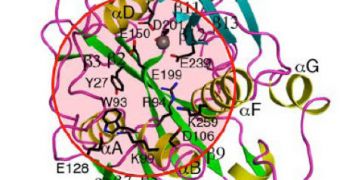For the first time ever, researchers at the Rutgers University managed to shed light on a mechanism that ensures the quality of newly-produced proteins. Such a pathway is of tremendous importance for the good functioning of cellular life.
The quality-control mechanism is especially important for yeast cells, which use it to ensure that the new proteins released “into the wild” will not turn on the cell itself.
Essential for the protein production process are the information encoded in a type of ribonucleic acid called messenger RNA (mRNA). Ribosomes use this data to create the needed proteins from amino-acids, PhysOrg reports.
Thanks to Xinfu Jiao and Megerditch Kiledjian, who are both based at the Rutgers University, we now have a full understanding of how cells give their “consent” for new proteins to be released within.
Key in this control pathway is the protein called Rai1, which simply checks all new products, to ensure that they meet quality standards.
The new study implies that mRNA does not attach to the ribosomes however it pleases, as researchers initially thought. This binding process is in fact severely regulated by some tight norms.
According to Kiledjian and Jiao, having this understanding of the entire system could in the near future aid us in developing means of manipulating it to our benefit.
Details of the groundbreaking research were published in the latest issue of the top-rated scientific journal Nature.
“Any time aberrant molecules, RNA or otherwise, accumulate in a cell, it increases the likelihood that normal cellular processes could be disrupted and could potentially lead to a disease state if left unchecked,” says Kiledjian.
“I’m guessing defects in Dom3Z, the mammalian homolog of Rai1, will eventually be found to contribute to at least some forms of human disorders,” adds the expert, who is a Rutgers School of Arts and Sciences professor of cell biology and neuroscience.
The recent investigation does not have applications in human cells by itself, but the team is convinced that the new data could inspire microbiologists working on human tissues and cells to start their own studies into the issue.
Future chemicals derived from such studies could ensure that diseases caused by malfunctioning proteins do not develop entirely, or do not affect as many people as they do today.

 14 DAY TRIAL //
14 DAY TRIAL //